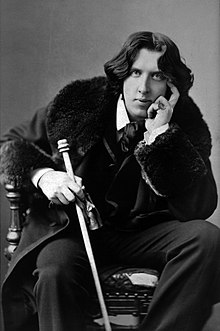On May 19, 1897, writer Oscar Wilde is released from jail
after two years of hard labor. His experiences in prison were the basis for his
last work, The Ballad of Reading Gaol (1898). Wilde was born and
educated in Ireland. He studied at Oxford, graduated with honors in 1878, and
remained in London. He became a popular society figure valued at dinner parties
for his witty remarks. Embracing the late 19th century aesthetic movement, which
embraced art for art's sake, Wilde adopted the flamboyant style of a passionate
poet and self-published a volume of verse in 1881. He spent the following year
in the United States lecturing on poetry and art. Wilde's dapper wardrobe and
excessive devotion to art were parodied in Gilbert and Sullivan's operetta Patience
in 1882.
After returning to Britain, Wilde married and had two
children. In 1888, he published a collection of fairy tales he wrote for his
children. Meanwhile, he wrote reviews and became editor of Women's World.
In 1891, his only novel, The Picture of Dorian Gray, was published. He
wrote his first play, The Duchess of Padua, the same year and wrote five
more before his arrest. His most successful comedies, including The
Importance of Being Earnest and Lady Windermere's Fan, are still
performed today. In 1891, the Marquess of Queensbury denounced Wilde as a
homosexual. Wilde, who was involved with the Marquess' son, sued the Marquess
for libel but lost the case when evidence supported the Marquess' allegations.
Because homosexuality was still considered a crime in England, Wilde was
arrested. Although his first trial resulted in a hung jury, a second jury
sentenced him to two years of hard labor. After his release, Wilde fled to
Paris and began writing again. He died of acute meningitis just three years
after his release.
Michael Thomas
Barry is the author of Great Britain’s Literary Legends.
The book can be purchased from Amazon through the following links:



No comments:
Post a Comment